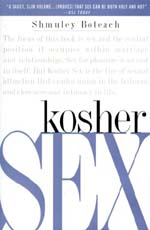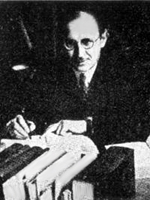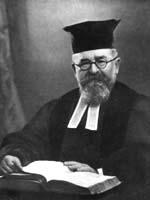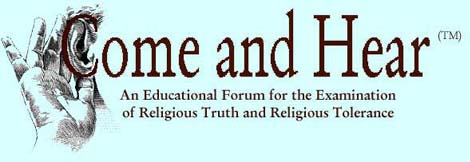New America
5. Really, Really Kosher Sex

There are changes in the wind. Some people may be happy, some may be unhappy. Let's go directly to the Talmud to see its laws on some social concerns.
| Navigate This Site | |
 | |
| Home | |
| Valentine | |
| Dilling | |
| Talmud | |
| The Rabbis | |
| Supplement | |
| Glossary | |
| Download | |
| Admin | |
| | |

Rabbi Shmuley Boteach, Orthodox Hasidic, and author of Kosher Sex: A Recipe for Passion and Intimacy. On page 69, Rabbi Boteach recommends the Christian missionary position!
"Jewish sensual laws revolve around a constant attempt to promote and sustain emotional intimacy of married couples through physical intimacy. We can immediately and intuitively appreciate how the missionary position leads to this closeness and familiarity. In no other sexual position do we see a meeting of the mouths accompanied by a full integration of all the limbs. Not only are husband and wife locked together in the genital region, but they coalesce in their totality so that even in appearance they become as one. The missionary position allows us to experience something that is quintessentially human." — Rabbi Boteach (2)
 Wherein does Rabbi Boteach's advice differ from that of your local parish priest?
Wherein does Rabbi Boteach's advice differ from that of your local parish priest?

"Sex is the holiest human experience, the highest form of knowledge." — Shmuley Boteach, Judaism for Everyone (dust jacket)
"He talks brilliantly, nine times faster than is quite normal … he puffs on a giant cigar as secretaries run in and out with messages from newspapers around the world." — The Evening Standard (19)
 "The rabbis made female orgasm an obligation incumbent on every Jewish husband. No man was allowed to use a woman merely for his own gratification." — Rabbi Boteach (1)
"The rabbis made female orgasm an obligation incumbent on every Jewish husband. No man was allowed to use a woman merely for his own gratification." — Rabbi Boteach (1)

Do YOU know the difference between Mishnah and Gemara?
In any field of study, the internal logic of the subject and the terms — the nomenclature — are of utmost importance. This is true of the Talmud, too. Critical Words of Talmud Study is a must read. Let the rabbis educate you.

Fish?
… a man may do whatever he pleases with his wife [at intercourse]: A parable; Meat which comes from the abattoir, may be eaten salted, roasted, cooked or seethed; so with fish from the fishmonger. — Nedarim 20b

Wherein does it differ?
Using a gentle euphemism for anal intercourse, the Talmud Sages relate that:
A woman once came before Rabbi and said, 'Rabbi! I set a table before my husband, but he overturned it.' Rabbi replied: 'My daughter! the Torah hath permitted thee to him — what then can I do for thee?'
A woman once came before Rab and complained. 'Rabbi! I set a table before my husband, but he overturned it.' Rab replied; Wherein does it differ from a fish? — Nedarim 20b
See above for an explanation of the rabbi's remark.

Ancient Classic
"Sexual frankness without a hint of guilt or prurience is the great legacy which the Eastern, and in particular Indian, traditions have given us. As an expression of human culture, and as a pillow book for the modern boudoir, the Kama Sutra of Vatsyayana the most famous work on sex ever written the Ananga-Ranga of Kalyana Malla, and Sheikh Nefzai's Perfumed Garden, set forth the principles of sensual pleasure with poetry, wisdom, and humor, celebrating love as an ecstatic expression of life's beauty." — publisher's editorial review
Move over Kama Sutra, here comes the Talmud.

Rabbi Shmuley Boteach is author of Kosher Sex.
"Kosher Sex will change how you view discuss, and approach sex. With humor, sensitivity, respect, and honesty, Rabbi Boteach touches on all the modern questions concerning this eternally interesting topic." — Kosher Sex dust jacket.

Rabbi Dr. Isidore Epstein, editor of the Soncino Talmud, writes:
"Whilst prizing chastity above all other virtues, they refused to ascribe anything degrading to the marital union per se. Prenuptial connections, whether in the case of men or women, they did truly condemn. Not only was harlotry prohibited by them on the basis of Biblical commands (Lev. XIX, 29, and Deut. XXIII, 18), but they even went so far as to forbid the private association of sexes. Yet the regulated sexual relations between husband and wife were raised to the dignity of a positive command. Thus it is the unmarried man who was said by them to live in unchastity — at least in the inescapable unchastity of thought if not of action; whereas the married man alone could live in purity. No wonder that they regarded marriage as a holy state, entrance into which carried with it forgiveness of sins. For this reason they encouraged early marriage, declaring eighteen to be the ideal age, although realists as they were, they insisted on a man being in a position to provide for a wife before venturing into matrimony." — Rabbi Dr. Epstein (4)

The late Dr. Joseph Herman Hertz, the Very Reverend the Chief Rabbi of the British Empire, writes:
"A conclusive proof of woman's dominating place in Jewish life is the undeniable fact, that the hallowing of the Jewish home was her work; and that the laws of chastity were observed in that home, both by men and women, with a scrupulousness that has hardly ever been equalled. The Sages duly recognized her wonderful spiritual influence, and nothing could surpass the delicacy with which respect for her is inculcated: 'Love thy wife as thyself, and honour her more than thyself. Be careful not to cause woman to weep, for God counts her tears. Israel was redeemed from Egypt on account of the virtue of its women. He who weds a good woman, it is as if he had fulfilled all the precepts of the Torah' (Talmud)." — Rabbi Dr. Hertz (5)

Talmudic Discussion by Mark Gertler (12)
"Long ago, well before Christianity enacted legislation forbidding its clerics from marrying or having sex, the ancient rabbis were giving explicit sexual advice to married men and women as to how they could enjoy pleasurable yet holy intimate relations." — Rabbi Boteach (1)
Nevertheless, Rabbi Boteach's efforts to enliven America's married sex life seem doomed to failure. The Sages of the Talmud do not foresee a bright future for legitimate sexual relations:
Rab Judah said in Rab's name: A man once conceived a passion for a certain woman, and his heart was consumed by his burning desire [his life being endangered thereby]. When the doctors were consulted, they said, 'His only cure is that she shall submit.' Thereupon the Sages said: 'Let him die rather than that she should yield.' Then [said the doctors]; 'let her stand nude before him;' [they answered] 'sooner let him die'. 'Then', said the doctors, 'let her converse with him from behind a fence'. 'Let him die,' the Sages replied 'rather than she should converse with him from behind a fence.' … Then why not marry her? — Marriage would not assuage his passion, even as R. Isaac said: Since the destruction of the Temple, sexual pleasure has been taken [from those who practise it lawfully] and given to sinners, as it is written, Stolen waters are sweet, and bread eaten in secret is pleasant. — Sanhedrin 75a
(Quoting Proverbs 9:17)

Animals such as these — not these in particular of course, but possibly their relatives — sometimes enticed Jews to commit unnatural acts with them. Perhaps as a lesson to others in the herd not to follow their example, or perhaps to save other men from being enticed to crime — the beast was stoned. At least, sometimes it was considered a crime under certain circumstances, and some of the ancient Sages considered it always a crime — at least for men, if not for women — if there were two witnesses and both warned the sodomite before his/her act.

Babylonian Talmud. Put all prejudice aside. We have 3.5 million words of the Talmud on line. Now you can read this classic work in context. Do your own research using the Come and Hear™ Search Engine.
"… the Talmud is one of the wonders of the world … It still dominates the minds of a whole people, who venerate its contents as divine truth …" — Rabbi Michael L. Rodkinson

Dr. Peter Singer, who is Jewish ("My mother and father, who were also Jewish of course …"(9)), is Professor of Ethics in the Center of Human Values at Princeton University. In 2001, he published a review of a book on the subject of bestiality. (10) In that review (published by Nerve.com), he calls bestiality "the last taboo." Since that time, controversy has swirled around Singer's real position on a number of issues. Perhaps Singer's readers are confused by his use of the words "the last taboo." The word "taboo" was used by the Jewish Dr. Sigmund Freud and his successors to indicate a superstitious prohibition that should be abolished. Singer's words have been broadly interpreted as a personal endorsement of human sex with animals. Animal rights activists also worry about Singer's position on consensual sexual relations between man and beast: Can an animal really give consent? Curiously, Professor Singer has allowed the controversy about his real intent to continue, even though he could easily speak out to clarify his stance.

A partner in consensual sex?
Raba said: The Torah ordered that the animal should be destroyed, because it too derived pleasure from sin. (Sanhedrin 55a)
The beast, like the man, was tried by a court of 23, and if found guilty, stoned. (Sanhedrin 2a)

It Once Happened …
When R. Dimi came he related: It once happened at Haitalu that while a young woman was sweeping the floor a village dog covered her from the rear, and Rabbi permitted her to marry a priest. Samuel said: Even a High Priest. But was there a High Priest in the days of Rabbi? — Rather, [Samuel meant]: Fit for a High Priest. — Tractate Yebamoth 59b

You can help in the battle for Truth, Justice, and the American Way! Fight the forces of censorship and suppression of the Talmud, and bring about understanding between peoples of different faiths.
Download this site to your desktop computer.
Make CDs and distribute them to friends, neighbors, ministers, and community leaders.
Email your favorite essay to your email list.
Post your favorite essay to discussion forums.
Print your favorite essays and give them to those not on the Internet.
Flyers advertising Come-and-Hear.com can be distributed throughout your community.
 Genuine Come and Hear™ CDs do not contain executable programs. When making CDs, do not include any files that end in .exe, .com, .bat, .vbs, .doc, .pif, .sit, or .scr. The person receiving the CD should use his own browser to view the files. This helps to protect him from harmful programs and viruses.
Genuine Come and Hear™ CDs do not contain executable programs. When making CDs, do not include any files that end in .exe, .com, .bat, .vbs, .doc, .pif, .sit, or .scr. The person receiving the CD should use his own browser to view the files. This helps to protect him from harmful programs and viruses.

Single White Female?
Recalling the Madison Avenue dictum that "Sex Sells," a prominent rabbi hopes to use sex as a selling point for Judaism. Certainly, none of us would refuse richer and more fulfilling sexual expression in our lives. Let's see what the Judaism has to offer.
Rabbi Shmuley Boteach, author of Kosher Sex: A Recipe for Passion and Intimacy, presents Jewish sex as far superior to the sex of other denominations. Jewish sex is a new dawn on the Sexual Frontier.
Long ago, well before Christianity enacted legislation forbidding its clerics from marrying or having sex, the ancient rabbis were giving explicit sexual advice to married men and women as to how they could enjoy pleasurable yet holy intimate relations. The rabbis made female orgasm an obligation incumbent on every Jewish husband. No man was allowed to use a woman merely for his own gratification.
— Rabbi Shmuley Boteach (1)
As we consider what Rabbi Boteach has to say, we will see him contradict the teachings of the Talmud. Is Rabbi Boteach misrepresenting Judaism? Before coming to a conclusion, recall that in Judaism, the definition of key terms can vary with the context and the speaker, and sometimes with the speaker's intent (see Critical Words of Talmud Study).
Judaism's Elastic Terms
Moreover, definitions are extremely elastic. According to the Glossary of the Soncino Talmud, "Torah" can denote "(a) the Pentateuch (Written Law); (b) the Mishnah (Oral Law); (c) the whole body of Jewish religious literature." (13) The Very Reverend the Chief Rabbi of the British Empire the late Dr. Joseph H. Hertz writes that the Torah is constantly evolving:
… the revelation, the real Torah, was the meaning of that Written Text, the Divine thought therein disclosed, as unfolded in ever greater richness of detail by successive generations of devoted teachers.
— Rabbi Dr. Hertz (14)
So Torah is not just Scripture, it's also the interpretation of Scripture, and the interpretation of interpretations. In the extensive definition, Torah is the entire body of Jewish religious literature, and Jewish religious literature is whatever the rabbis accept as such. It is an ever-expanding library that may, and does, contain contradictory teachings. (20)
In consequence, a popularizer like Rabbi Boteach is free to choose whichever teaching suits his target audience, and represent it as the doctrine of Judaism. (16)
But since the Talmud, according to so many experts, is the Word of God, the basic book of Jewish law and the foundation of Jewish culture, we will compare Rabbi Boteach's representations with the words of the Talmud. The US Supreme Court takes the Talmud Sages seriously enough to accept a brief based wholly on Talmud law. (15) We, too, take the Talmud Sages seriously.
(Note: In upcoming Talmud excerpts, we sometimes omit non-germane text and footnotes. Omission of text is indicated by an ellipsis (…). To see the full text and footnotes, follow the hot link at the end of the excerpt. It is our pleasure to make available on line a number of Talmud tractates, so that you can see the excerpt in full context. We indicate unprintable Hebrew characters, words, and phrases with the symbol [H].)
Wherein Does It Differ from Fish?
The Talmud does not support Rabbi Boteach's assertion that the Jewish husband is obligated to give his wife pleasure. For example, Tractate Nedarim 20b describes a situation that arises in two marriages: the husbands insist on anal intercourse but the wives object. Using the euphemism "overturned table" to signify anal intercourse, both wives seek rulings from the rabbis. The principle cited in the rabbinical ruling is given first.
GEMARA. … a man may do whatever he pleases with his wife [at intercourse]: A parable; Meat which comes from the abattoir may be eaten salted, roasted, cooked or seethed; so with fish from the fishmonger. (4) …
A woman once came before Rabbi and said, 'Rabbi! I set a table before my husband, but he overturned it.' Rabbi replied: 'My daughter! the Torah hath permitted thee to him — what then can I do for thee?' A woman once came before Rab and complained. 'Rabbi! I set a table before my husband, but he overturned it.' Rab replied; Wherein does it differ from a fish? (6)
— Babylonian Talmud, Tractate Nedarim 20b
Soncino 1961 Edition, page 58
Rabbi Dr. H. Freedman comments on the text in the footnotes; though Rabbi Dr. Freedman asserts mutual pleasure is the goal, clearly the rabbis have ruled in favor of the exclusive pleasure of the husband:
- [This parable serves to express the absence of reserve that may characterise the mutual and intimate relationship of husband and wife without offending the laws of chastity.]
…- V. supra.
— Rabbi Dr. Freedman
The expression "overturned the table" is defined on the previous page of the Soncino Talmud:
GEMARA. … R. Johanan b. Dahabai said: The Ministering Angels told me four things: People are born lame because they [sc. their parents] overturned their table [i.e., practised unnatural cohabitation]; dumb, because they kiss 'that place'; deaf, because they converse during cohabitation; blind, because they look at 'that place'.
— Babylonian Talmud, Tractate Nedarim 20a
Soncino 1961 Edition, page 57
Returning to the tales of the unhappy wives: Despite the women's objections, both rabbis rule that a woman must accommodate her husband in his demands. This does not support Rabbi Boteach's statement, "No man was allowed to use a woman merely for his own gratification."
Consider the warning of the Ministering Angels (quoted in the above Gemara): Husbands and wives should not converse during intercourse; they should not kiss "that place"; they should not look at "that place." But what is "that place?" The Sages do not specify.
The Talmud's Ministering Angels are beginning to sound like prudes, putting many boundaries on Rabbi Boteach's "pleasurable yet holy intimate relations."
She Screams in Pain
It was apparently not unusual for a woman to scream during intercourse in the days of the Sages, and the Sages addressed the phenomenon of "the screamer" in the Talmud. In the following Mishnah, the Sages are laying down the rules for women who may be divorced without receiving their kethuboth (one-time financial settlement). We have omitted non-germane text (…) and the footnotes. To see the footnotes and the text in its entirety, follow the link at the end of the cite.
MISHNAH. … R. TARFON SAID: ALSO ONE WHO SCREAMS. AND WHO IS REGARDED A SCREAMER? A WOMAN WHOSE VOICE CAN BE HEARD BY HER NEIGHBOURS WHEN SHE SPEAKS INSIDE HER HOUSE.
— Babylonian Talmud, Kethuboth 72a
Soncino 1961 Edition, page 449
The Gemara explains that the wife screams during intercourse, and this should be regarded as a defect.
GEMARA. … R. TARFON SAID: ALSO ONE WHO SCREAMS. What is meant by a screamer? — Rab Judah replied in the name of Samuel: One who speaks aloud (10) on marital matters. In a Baraitha it was taught: [By screams was meant a wife] whose voice (11) during her intercourse in one court can be heard in another court. But should not this, then, (12) have been taught in the Mishnah (13) among defects? (14) — Clearly we must revert to the original explanation. (15)
— Babylonian Talmud, Tractate Kethuboth 72b
Soncino 1961 Edition, page 453
Rev. Dr. Israel W. Slotki amplifies the above Gemara in the following footnotes. He tells us that the screams during intercourse that concern the Sages were not screams of pleasure — they were screams of pain.
- Lit., 'makes her voice heard'.
- Her screams of pain caused by the copulation.
- Since her screaming is due to a bodily defect.
- Infra 77a.
- Of course it should. Such a case in our Mishnah is out of place.
- That given in the name of Samuel.
— Rev. Dr. Slotki
The rabbis (according to Rev. Dr. Slotki) assume "her screaming is due to a bodily defect." We are to believe, then, that a significant number of the daughters of Israel had a genital condition (classed as a "defect"), and experienced pain during intercourse. It is also possible that husbands followed rabbinical rulings, used their wives for anal intercourse, and didn't bother with lubricants. After all, anything that "may be eaten salted, roasted, cooked or seethed" does not have to be accommodated. For additional discussion of "the screamer," see And So a Talmud Marriage Ends.
Does it sound as though "The rabbis made female orgasm an obligation incumbent on every Jewish husband" as Rabbi Boteach says?
Rabbis Set the Schedule
Lets consider some more words from Rabbi Boteach:
Rather than offering prescriptive rules about sex and marriage, Judaism offers guidelines, or what might be called erotic channels of communication, designed not to circumscribe our sexual routine, but to focus it and make it potent, so that sex becomes passionate and effective in conjuring up long-term emotions and commitment.
— Rabbi Boteach (1)
Rabbi Boteach offers this characterization without footnotes or references to Jewish Scriptures. (21) However, we did find this in the Talmud:
MISHNAH. … THE TIMES FOR CONJUGAL DUTY PRESCRIBED IN THE TORAH ARE: FOR MEN OF INDEPENDENCE, EVERY DAY; FOR LABOURERS, TWICE A WEEK; FOR ASS-DRIVERS, ONCE A WEEK; FOR CAMEL-DRIVERS, ONCE IN THIRTY DAYS; FOR SAILORS, ONCE IN SIX MONTHS. THESE ARE THE RULINGS OF R. ELIEZER.
— Babylonian Talmud, Tractate Kethuboth 61b
Soncino 1961 Edition, page 369
If the above Mishnah is not a prescription, what is it? It sounds as though "the erotic channels of communication" are subject to wartime rations. Of course, we no longer have ass-drivers or camel-drivers in the Western world, but what conjugal schedule will contemporary rabbis prescribe for computer programmers, clarinet players, and Secretaries of Defense?
The Kethuboth 61b schedule does not tell the whole story, however. For approximately two weeks of each month — regardless of the husband's occupation — a husband and wife are forbidden to have sexual relations at all (see Talmud Laws of Menstruation [17]).
Testing Rags
To safeguard against accidentally having marital relations during the prohibited menstrual period (see Talmud Laws of Menstruation [17]), the virtuous daughter of Israel inserts testing rags into her vagina immediately before and after intercourse to discover any menstrual discharge. (17) It stands to reason that these rags absorb some of the vagina's natural lubricating fluids. Perhaps the procedure contributed to the pain of the "screamer" during intercourse?
Do It in the Dark
Rabbi Boteach is right. "Well before Christianity enacted legislation forbidding its clerics from marrying or having sex, the ancient rabbis were giving explicit sexual advice to married men and women …" And what was that explicit sexual advice? Do it in the dark.
GEMARA. … But according to your argument does intercourse take place at night and not in the day time? Surely Raba stated: If one was in a dark room [intercourse] is permitted!
— Babylonian Talmud, Tractate Kethuboth 56a
Soncino 1961 Edition, page 329
GEMARA. … Did not R. Huna state, The Israelites are holy and do not have intercourse in the day-time'? — But, Surely, Raba stated: It is permitted in a dark room.
— Babylonian Talmud, Tractate Kethuboth 65b
Soncino 1961 Edition, page 397
See also Shabbath 86a, Soncino 1961 Edition, page 409 for the similar statement.
GEMARA. … R. Huna said, Israel are holy and do not perform their marital duties in the day-time. Raba said, But in a dark house this is permitted; and a scholar may darken a room with his cloak and perform his marital duty. [But] we have learnt, OR SHE MUST PERFORM IT IN THE LIGHT OF A LAMP? — Read: SHE MUST examine IT IN THE LIGHT OF A LAMP.
Come and hear: Although [the Sages] have said, He who has intercourse in the light of a lamp is loathsome [etc.]? — Read: He who examines his bed in the light of a lamp is loathsome.
— Babylonian Talmud, Tractate Niddah 17a
Soncino 1961 Edition, page 114
The reasons for this advice are not flattering to the wife. If you see your wife in the act of love, you may come to loath her, say the Sages.
GEMARA. … R. Hisda ruled: A man is forbidden to perform his marital duty in the day-time, for it is said, But thou shalt love thy neighbour as thyself. But what is the proof? — Abaye replied: He might observe something repulsive in her and she would thereby become loathsome to him.
— Babylonian Talmud, Tractate Niddah 17a
Soncino 1961 Edition, page 114
Apply the same logic next time you go to a restaurant: To avoid seeing something that might kill your appetite, wear a blindfold at the table. Seriously. Drop us a line and let us know how it works out.
Contraception
In this discussion, the ruling opinion of the Sages is that contraception is forbidden. R. Meir disagrees, and opines that three categories of women to use "absorbents." Footnotes omitted; to see them follow the link below.
GEMARA. … Three [categories of] women may use an absorbent in their marital intercourse: A minor, a pregnant woman and a nursing woman. The minor, because [otherwise] she might become pregnant, and as a result might die. A pregnant woman, because [otherwise] she might cause her foetus to degenerate into a sandal. A nursing woman, because [otherwise] she might have to wean her child prematurely and this would result in his death. And what is the age of such a minor? From the age of eleven years and one day until the age of twelve years and one day. One who is under, or over this age must carry on her marital intercourse in the usual manner. This is the opinion of R. Meir. The Sages, however, say: The one as well as the other carries on her marital intercourse in the usual manner, and mercy will be vouchsafed from heaven, for it is said in the Scriptures The Lord preserveth the simple.
— Babylonian Talmud, Tractate Yebamoth 12b
Soncino 1961 Edition, page 62
Thus R. Meir is voted down. No one may use contraception, ever, and the woman must carry on her sexual duties, even if pregnancy would endanger her life. Notice that the Sages do not dispute the effects of pregnancy on the women under discussion: Danger of death in childbirth when the mother is so young; injury to the fetus being carried by the mother, and death of the child being nursed by the mother.
The word of the Sages is settled law. The same proscription against contraception, almost world for word, can be found in Kethuboth, 39a
This doctrine forms an interesting contrast with that of the Catholic Church. The Church allows a woman to abstain from intercourse during her most fertile time of the month. The rabbis, however, enforce abstinence on a wife during the least fertile part of her menstrual cycle (see Talmud Laws of Menstruation), and require her to have regular intercourse otherwise.
What will the anti-contraception doctrine mean for America when Talmud law fully supplants Gentile law? We are eagerly waiting to find out.
America Is Rapidly Becoming Talmudized
In 1991, the US Congress declared the Talmudic Noahide Laws to be the basis "upon which our great Nation was founded" (see America's New Government Church). Under Noahide Law regulations, idolaters (which includes Christians by definition) are put to death.
In 1999, the Supreme Court agreed to consider an amicus brief based wholly on Talmudic law (see Sentence and Execution).
In November 2002, the American Orthodox Jewish community held a kosher dinner in the Supreme Court building to celebrate the establishment of the National Institute for Judaic Law. (6) The dinner was attended by 200 people, including three Supreme Court Justices. The purpose of the Institute is to introduce Talmudic laws into the US legal system and law schools.
It is thus the clear civic duty of every American to become intimately acquainted with the Talmud. Read articles at:
America's New Government Church: http://www.come-and-hear.com/editor/america_1.html
Death Penalty: http://www.come-and-hear.com/editor/capunish_1.html
Kosher Dinner: http://www.come-and-hear.com/editor/cp-jp-11-09-2002 and http://www.come-and-hear.com/editor/cp-jw-01-08-03
More Sexual Do's and Don'ts
Rabbi Boteach told us earlier, "Well before Christianity enacted legislation forbidding its clerics from marrying or having sex, the ancient rabbis were giving explicit sexual advice to married men and women as to how they could enjoy pleasurable yet holy intimate relations." Let us seek out more of their advice from the Talmud.
GEMARA. … Rabbah b. Bar Huna said: If a man immediately on returning from a journey has marital intercourse, his children will be weaklings. The Rabbis taught: On coming from a privy a man should not have sexual intercourse till he has waited long enough to walk half a mil, because the demon of the privy is with him for that time; if he does, his children will be epileptic. The Rabbis taught: If a man has sexual intercourse standing, he will be liable to convulsions; if sitting, to spasms; if she is above and he below, he will be subject to delaria [diarrhoea].
— Babylonian Talmud, Tractate Gittin 70a
Soncino 1961 Edition, page 333
GEMARA. … Three things enfeeble a man's body, namely, to eat standing, to drink standing, and to have marital intercourse standing.
Five are nearer to death than to life, namely, one who eats and rises immediately, or who drinks and rises immediately, or who lets blood and rises immediately, or who rises immediately on waking or after marital intercourse.
If one does the following six things [together], he will die immediately: if he comes weary from a journey, lets blood and has a bath and drinks himself drunk and lies down to sleep on the floor and has marital intercourse. R. Johanan said: That is, if he does them in this order; Abaye said: If he does them in this order he will die; if not in this order he will fall ill. Is that so? Did not [a certain] Me'orath do three of these things to her slave and he died? — He was a weakling.
— Babylonian Talmud, Tractate Gittin 70a
Soncino 1961 Edition, page 334
Here's a passage full of advice. It, like the others, gives us insight into the folkways of Talmudic society. Among the advice: A wife should not demand her conjugal rights, and a man should avoid having intercourse with one wife while thinking of another wife — he may, however, think of a woman who is not his wife.
GEMARA. … And that ye seek not after your own heart. (7) [Deducing] from this Rabbi taught: One may not drink out of one goblet and think of another. (8) Rabina said: This is necessary only when both are his wives.
And I will purge out from among you the rebels, and them that transgress against me. (1) R. Levi said: This refers to children belonging to the following nine categories: children of fear, (2) of outrage, of a hated wife, one under a ban, (3) of a woman mistaken for another, (4) of strife, (5) of intoxication [during intercourse], of a mentally divorced wife, (6) of promiscuity, and of a brazen woman. (7) But that is not so: for did not R. Samuel b. Nahmani say in the name of R. Jonathan: One who is summoned to his marital duty by his wife will beget children such as were not to be found even in the generation of Moses? For it is said, Take you wise men, and understanding [and known among your tribes, and I will make them rulers over you]; (8) and it is written, So I took the chiefs of your tribes, wise men and known (9) but 'understanding' is not mentioned. (10) But it is also written, Issachar is a large-boned ass; (11) whilst elsewhere it is written, And of the children of Issachar, which were men that had understanding of the titles? (12) — [It is virtuous] only when the wife ingratiates herself [with her husband]. (13)
— Babylonian Talmud, Tractate Nedarim 20b
Soncino 1961 Edition, pages 58-59
Rabbi Dr. H. Freedman amplifies the text with footnotes:
- Num. XV, 39.
- Whilst cohabiting with one woman to think of another.
- Ezek. XX, 38.
- When a husband imposes himself upon his wife by force; Asheri reads: children of a maidservant ([H] instead of [H]); v. MGWJ 1934 p. 136. n. 1.
- A person under a ban was forbidden to cohabit.
- Having intended to cohabit with one of his wives, he cohabited with another.
- Not a hated wife, but one with whom he had just then quarrelled.
- I.e., when her husband has decided to divorce her.
- One who openly demands her conjugal rights.
- Deut. I. 13.
- Ibid. I, 15.
- The Heb. [H] is here taken to denote the highest degree of wisdom - but such could not be found.
- Gen. XLIX, 14; cf. Gen. XXX. 16-18. The allusion is to the legend that Leah heard the braying of Jacob's ass, and so came out of the tent and said to Jacob, thou must come in unto me. She had thus demanded her conjugal rights.
- I Chron. XII. 33; though such men were not to be found in the days of Moses. This was Leah's reward, thus proving that it is meritorious for a woman to demand her rights.
- She may shew her desires, as did Leah, who merely invited Jacob into her tent, but not explicitly demand their gratification.
— Rabbi Dr. Freedman
The First Night
If a bridegroom does not perform the marital act on the first night following the wedding, he may fall into a delicate mental and emotional state, and is therefore is excused from saying his prayers (the Shema'). In the following, footnotes have been omitted, and the ellipses indicate omission of non-germane text. To see the footnotes and the text in its entirety, follow the link at the end of the cite.
GEMARA. … R. Joseph objected: A bridegroom is free from the reading of Shema' in the first night until the night following the Sabbath, if he has not performed [yet] an act. Is it not because he is anxious to perform the marital act? — Said Abaye to him: No; he is anxious because he has not had intercourse …
… But, said Raba, this is a dispute of Tannaim, for one [Baraitha] teaches: If he did not do an act [of coition] in the first [night], he is free [from reading Shema'] also in the second [night]; in the second [night], he is free [from reading Shema'] also in the third [night]. And another [Baraitha] teaches: [In] the first and second [night] he is free, [but in] the third [night] he is obliged [to read Shema']. And Abaye [holds that] there also [they] differ with regard to anxiety. And these Tannaim [are] like those Tannaim, for it has been taught [in a Baraitha]: He who marries a maiden shall not perform the first intercourse on Sabbath, and the Sages allow [it].
— Babylonian Talmud, Tractate Kethuboth 6b
Soncino 1961 Edition, pages 22-23
A discussion ensues on whether the groom should perform the first marital act on the Sabbath. The answer depends on the intentions of the groom. If he intends improvement of his wife's anatomy by tearing her hymen, Sabbath intercourse is forbidden because it is defined as work. If he intends to "make an opening," that falls under the category of "building" and is prohibited. If his intention is to damage or wound his new bride, however, Sabbath intercourse is permitted because wounding and destructive acts are permitted on the Sabbath. The reasoning is extremely close, but the operant phrase appears at the end: "does he do damage in regard to the opening, or does he improve in regard to the opening?"
GEMARA. … The question was asked: Is it allowed (15) to perform the first marital act on Sabbath? (16) Is the blood [in the womb] stored up, (17) or is it the result of a wound? (18) And if you will say (19) [that] the blood is stored up [in the womb, then the question arises:] is he concerned about the blood, (20) and it is allowed: or is he concerned with the opening, (1) and it is forbidden? (2) And if you will say [that] he is concerned with the blood and the opening comes of itself, [then the question arises:] Is the halachah (3) according to R. Simeon who says: A thing which is not intended (4) is allowed; or is the halachah according to R. Judah who says: A thing which is not intended is forbidden? (5) And if you will say [that] the halachah is according to R. Judah [then the question arises], does he do damage in regard to the opening, or does he improve in regard to the opening? (6)
— Babylonian Talmud, Tractate Kethuboth 5b
Soncino 1961 Edition, pages 18-19
Rev. Dr. Israel W. Slotki amplifies the above Gemara in the following footnotes.
- Lit., 'How is it?
- When the intercourse could not take place before Sabbath, (Tosaf.).
- And the intercourse would he allowed, since the blood flows out of its own accord, no wound having been made.
- Lit., 'or is it wounded?' And the intercourse would be forbidden.
- Lit., 'And if you should he able to say.'
- Is his aim to release it? Lit., 'is it the blood he requires?' [According to Tosaf.: In order to see whether she is a virgin.]
- Or is his aim to make an opening?
- It is forbidden to make an opening on Sabbath. [Such an act comes under the category of 'building'.]
- 'Adopted opinion', 'rule'.
- An act which is in itself forbidden but is the unintended though unavoidable result of an act which is permitted. Thus one may, according to R. Simeon, push a couch on the floor, on Sabbath, if one has not the intention to make a rut in the floor, although, as a matter of fact, such a rut is made as the unavoidable result of pushing the couch.
- R. Judah's view is opposed to that of R. Simeon; v. n. 4.
- Is the making of the opening considered to be to the advantage or disadvantage of the woman? If it is to her disadvantage it would he allowed even according to R. Judah. [Based on the principle that an act of damage does not constitute labour in regard to Sabbath. V. Shab. 106a.]
— Rev. Dr. Slotki
Unusual Abscess and Pus Imagery
The discussion on the legality of having the first intercourse on the Sabbath continues. In this excerpt, Rabbi Ammi compares deflowering of the virgin bride to opening an abscess and draining it of pus.
GEMARA. … R. Ammi objected: (1) He who pierces (2) an abscess on Sabbath, if [in order] to make an opening (3) to it, he is guilty, (4) but if [in order] to cause pus to come out of it [7a] he is free from punishment]? (5) — There (6) it is (7) stored up (8) and is [entirely] loose, (9) here (10) it (11) is stored up (12) but is not [entirely] loose. (13) R. Ammi allowed [couples] to have first intercourse (14) on Sabbath.
— Babylonian Talmud, Tractate Kethuboth 6b-7a
Soncino 1961 Edition, page 24
Rev. Dr. Israel W. Slotki amplifies the above Gemara in the following footnotes. Note in particular footnote 5, stressing that the destructive nature of this coition makes the act permissible on the Sabbath.
- V. 'Ed. (Sonc. ed.) p. 12 nn. 5-6.
- Lit., 'loosens.' Jast.: 'manipulates.'
- Lit., 'mouth'.
- Of Sabbath-breaking.
- And permitted: v. Shab. 107a and 3a. Intercourse should thus be permitted on Sabbath for the first time, even when the aim is the bleeding!
- In the case of the abscess.
- The blood.
- In the abscess.
- From the flesh.
- In the case of the virgin-bride.
- The blood.
- In the womb.
- From the walls of the womb. [Read with MS.M. 'It is neither stored up nor loose,' but the result of a wound, hence forbidden.]
- Lit., 'to perform in the beginning'.
— Rev. Dr. Slotki
Many of the Talmudic traditions concerning the First Night of the young couple will be unfamiliar to most Americans. But they should be given a respectful hearing, nonetheless. We are sure you will agree.
Animals Are People, Too
Now let us consider another subject important to the Talmud Sages: Bestiality. It seems to have been quite a problem. The rabbinical rulings on bestiality are complex and the rabbis make many subtle distinctions. (18) The Sages weigh carefully whether the human is male or female, whether the man uses the vagina or the anus of the beast, whether the beast uses the vagina or the anus of the woman, and whether the human is a minor child. The Sages take note that of a man, only the anus is available for passive intercourse ("unnatural").
Perhaps the most interesting difference between our own view of bestiality and the Talmudic view is that the Sages consider the animal should suffer punishment because it "derived pleasure from sin." The notion that an animal can sin is distinctly foreign to Western cultures founded upon Christian ideology.
GEMARA. … Raba said: The Torah ordered that the animal should be destroyed, because it too derived pleasure from sin.
— Babylonian Talmud, Tractate Sanhedrin 55a
Soncino 1961 Edition, page 375
Let us now review the Mishnah on bestiality:
MISHNAH. HE WHO COMMITS SODOMY WITH A MALE OR A BEAST, AND A WOMAN THAT COMMITS BESTIALITY ARE STONED. IF THE MAN HAS SINNED, WHEREIN HAS THE ANIMAL OFFENDED? BUT BECAUSE MAN WAS ENTICED TO SIN THEREBY, SCRIPTURE ORDERED THAT IT SHOULD BE STONED. ANOTHER REASON IS THAT THE ANIMAL SHOULD NOT PASS THROUGH THE STREETS, WHILST PEOPLE SAY, THIS IS THE ANIMAL ON ACCOUNT OF WHICH SO AND SO WAS STONED.
— Babylonian Talmud, Tractate Sanhedrin 54a
Soncino 1961 Edition, page 367
The reasoning here is plain. The Sages feared leaving alive an animal used in bestiality. Other citizens might begin to look the ox over and get ideas about it, thus: "This is the animal on account of which so and so was stoned." Therefore it was meet that the ox be put away to prevent others from taking liberties with it.
A woman who commits bestiality in the presence of two witnesses, who warn her ahead of time on the gravity of her crime — might be tried for a capital offense. However, if either condition is not met (two witnesses, and a warning from each), she suffers no censure and retains her eligibility to marry a High Priest. We are not told what happens to the animal in this case.
GEMARA. … R. Shimi b. Hiyya stated: A woman who had intercourse with a beast is eligible to marry a priest. (4) Likewise it was taught: A woman who had intercourse with that which is no human being, (5) though she is in consequence subject to the penalty of stoning, (6) is nevertheless permitted to marry a priest. (7)
When R. Dimi came he related: It once happened at Haitalu that while a young woman was sweeping the floor a village dog covered her from the rear, and Rabbi permitted her to marry a priest. Samuel said: Even a High Priest. But was there a High Priest in the days of Rabbi? — Rather, [Samuel meant]: Fit for a High Priest.
— Babylonian Talmud, Tractate Yebamoth 59b
Soncino 1961 Edition, page 397
The translator, Rev. Dr. Israel W. Slotki, amplifies the text with footnotes.
- Even a High Priest. The result of such intercourse being regarded as a mere wound, and the opinion that does not regard an accidentally injured hymen as a disqualification does not so regard such an intercourse either.
- A beast.
- If the offence was committed in the presence of witnesses after due warning.
- In the absence of witnesses and warning.
— Rev. Dr. Slotki
Trials for Animals
In the United States, of course, we would not consider putting an animal to death, simply for being involved in situations like these. Nor would we consider the animal had any guilt in the commission of the crime.
Notice that the Mishnah of Sanhedrin 54a states, "… because [a] man was enticed to sin thereby." Obviously, the animals were considered deliberate and conscious seducers, possibly criminally inclined.
To forestall the possibility of injustice, the Sages — we think very fairly — provide trials for animals accused of capital offenses. A sodomy-inclined domestic beast or a wild beast is entitled to a formal trial before a panel of 23 judges to hear the evidence and to decide culpability.
MISHNAH. … CAPITAL CASES ARE ADJUDICATED BY TWENTY-THREE. THE PERSON OR BEAST CHARGED WITH UNNATURAL INTERCOURSE, BY TWENTY-THREE, AS IT IS WRITTEN, THOU SHALT KILL THE WOMAN AND THE BEAST, AND ALSO, AND YE SHALL SLAY THE BEAST.
THE OX TO BE STONED IS TRIED BY TWENTY-THREE, AS IT IS WRITTEN, THE OX SHALL BE STONED AND ITS OWNER SHALL BE PUT TO DEATH — AS THE DEATH OF THE OWNER, SO THAT OF THE OX, CAN BE DECIDED ONLY BY TWENTY-THREE.
THE DEATH SENTENCE ON THE WOLF OR THE LION OR THE BEAR OR THE LEOPARD OR THE HYENA OR THE SERPENT IS TO BE PASSED BY TWENTY-THREE. R. ELIEZER SAYS: WHOEVER IS FIRST TO KILL THEM [WITHOUT TRIAL], ACQUIRES MERIT, R. AKIBA, HOWEVER, HOLDS THAT THEIR DEATH IS TO BE DECIDED BY TWENTY-THREE.
— Babylonian Talmud, Tractate Sanhedrin 2a
Soncino 1961 Edition, page 2
Sages Not Unanimous
Not all Sages agreed on exceptions to the bestiality laws. At least one (R. Papa) insisted that all bestiality, regardless of type, should be considered a capital offense against Divine law — at least for men. Rabbinical scholar and translator Rev. Dr. H. Freedman explains the disagreements in footnotes:
- The reference is to bestiality. If a woman allows herself to be made the subject thereof, whether naturally or not, she is guilty. But if a man commits bestiality, he is liable only for a connection in a natural manner, but not otherwise. Thus Rashi. Tosaf., more plausibly, explains it thus: If one commits incest or adultery with a woman, whether naturally or not, guilt is incurred; but bestiality is punishable only for a connection in a natural manner, but not otherwise.
- The meaning according to the interpretation of Tosafoth is clear. Yet R. Papa's objection is not made in order to prove that unnatural incest is not liable (which, in fact, it is), but that if a distinction is to be drawn, unnatural bestiality is far more likely to be liable than unnatural incest. On Rashi's interpretation, R. Papa's objection is explained thus: Since a woman is naturally the passive object of sexual intercourse, it follows that she should be punished for bestiality only when the connection is carried out in a natural way. But as man is the active offender in an unnatural crime he should be punished even for unnatural connection. It must be confessed that this is not without difficulty, and hence Tosaf. rejects Rashi's explanation, which is based on a slightly different reading.
— Rev. Dr. H. Freedman (8)
Harlotry
According to the Very Reverend the Chief Rabbi of the British Empire, the late Dr. J. H. Hertz, Jewish society is extremely conservative and condemns sex outside marriage.
The satisfaction of the needs of physical and social companionship outside the sacred estate of matrimony, unhallowed by Religion and unrestrained by its commandments, Judaism considers an abomination.
— Rabbi Dr. Hertz (8)
According to Rabbi Dr. Isidore Epstein, editor of the Soncino Talmud, harlotry is condemned in the Old Testament and the Talmud. Speaking of the Talmud Sages, he writes:
Whilst prizing chastity above all other virtues, they refused to ascribe anything degrading to the marital union per se. Prenuptial connections, whether in the case of men or women, they did truly condemn. Not only was harlotry prohibited by them on the basis of Biblical commands (Lev. XIX, 29, and Deut. XXIII, I8) but they even went so far as to forbid the private association of sexes.
— Rabbi Dr. Epstein (7)
Old Testament — Whoredom Not Prohibited
Rabbi Dr. Epstein uses the word "harlotry," but the passages he cites (King James Version) refer to "whore" and "whoredom." It is indeed a common assumption that the Old Testament outlaws whoredom. Let us examine Rabbi Dr. Epstein's sources (Lev. 19:29, and Deut. 23:18). Those cites read as follows:
- Do not prostitute thy daughter, to cause her to be a whore; lest the land fall to whoredom, and the land become full of wickedness.
Leviticus 19:29 does not prohibit whoredom. LORD God prohibits a parent from "prostituting" his daughter. The command is not directed to the woman herself. Nor does LORD God prohibit a man from using prostitutes. Now let us look at another of Rabbi Dr. Epstein's cites.
- Thou shalt not bring the hire of a whore, or the price of a dog, into the house of the LORD thy God for any vow: for even both these are abomination unto the LORD thy God.
Upon review, we find that Deuteronomy 23:18 does not prohibit whoredom, anymore than it prohibits setting a price for a dog. Clearly, though one should not bring "the hire of a whore … into the house of the LORD," there is no prohibition on hiring a whore elsewhere.
Notice that neither verse prohibits a woman from being a whore, nor are the whore's customers prohibited from hiring her. If this is the strongest prohibition in the Old Testament (and you would expect Rabbi Dr. Epstein to use the best cites), we would have to say that the Bible, on a plain English reading, does not outlaw prostitution anymore than it outlaws selling dogs.
Talmud — Whoredom Permitted
Let's revisit Rabbi Dr. Hertz's statement:
The satisfaction of the needs of physical and social companionship outside the sacred estate of matrimony, unhallowed by Religion and unrestrained by its commandments, Judaism considers an abomination.
— Rabbi Dr. Hertz (11)
A reading of the Talmud suggests otherwise. Men are permitted to hire harlots provided the payment or gift and the act of intercourse are regarded as separate transactions.
GEMARA. … The scholars in the School of R. Jannai used to borrow fruits of the Sabbatical year from the poor and repay them in the eighth year. When this was reported to R. Johanan, he said to them, 'They act rightly'; and an analogy may be found in the matter of a harlot's hire which is permitted; for it has been taught: If he gave her [an animal] without having intercourse with her or had intercourse without giving it to her, her hire is permitted [for use in the Sanctuary]. Now if he gave her it without having intercourse with her, obviously [it may be devoted to the Sanctuary] for the reason that, having had no intercourse with her, he merely presented her with a gift! Further, if he had intercourse without giving it to her, behold he gave her nothing, and since he made no presentation to her what means that her hire is permitted! — This is what he intends: If he gave her it and subsequently had intercourse with her, or had intercourse with her and subsequently gave it to her, the hire is permitted But if he gave it to her and subsequently had intercourse with her, since he did have intercourse with her, [63a] the prohibition of the harlot's hire should apply retrospectively to [the animal]! — R. Eleazar replied: [It is permitted] when she first offered it. How is this to be understood? — If he said to her, 'Take possession of this at once,' then obviously it is permitted because it is no longer there at the time of intercourse and he merely presented her with a gift; but if he had not said to her, 'Take possession of this at once,' how could she offer it, since the All-merciful has declared, And when a man shall sanctify his house to be holy — as the house [which he sanctifies] must be in his possession, so must everything [which is dedicated to the Sanctuary] be in the person's possession! — Rather [must we suppose the circumstance] where he said to her, 'Let it be with you until the time of intercourse; but should you require it then take possession of it at once.'
— Babylonian Talmud, Tractate Abodah Zarah 62b-63a
Soncino 1961 Edition, pages 305-307
R. Eleazar was a Talmudic Sage. The following is a story about his habitual use of harlots, for which he apparently suffered no sanctions by the other Sages.
GEMARA. … It was said of R. Eleazar b. Dordia that he did not leave out any harlot in the world without coming to her. Once, on hearing that there was a certain harlot in one of the towns by the sea who accepted a purse of denarii for her hire, he took a purse of denarii and crossed seven rivers for her sake. As he was with her, she blew forth breath and said: As this blown breath will not return to its place, so will Eleazar b. Dordia never be received in repentance.
— Babylonian Talmud, Tractate Abodah Zarah, 17a
Soncino 1961 Edition, page 87
Conclusion
To review: Rabbi Shmuley Boteach states in his book, Kosher Sex: A Recipe for Passion and Intimacy: "Long ago, well before Christianity enacted legislation forbidding its clerics from marrying or having sex, the ancient rabbis were giving explicit sexual advice to married men and women as to how they could enjoy pleasurable yet holy intimate relations." (1) Let us review some of the Talmud advice we have seen here.
- Only in the dark
- No talking
- No kissing "that place"
- No looking at "that place"
- No standing
- No sitting
- No she-on-top
- Not just before rising
- Not upon returning from a journey
- Not with one wife while thinking of another wife (but OK if object of fantasy is not a wife)
- Not with a wife who is under a ban (i.e., forbidden to do it)
- Not with a wife you hate, one you've quarreled with, or one you've decided to divorce
- Not while drunk
- Not during menstruation, or for a week afterward (see Talmud Laws of Menstruation)
- Not before inserting testing rags into the vagina (see Talmud Laws of Menstruation)
- Not with a woman whom you mistake for another
- After returning from a privy, wait until the privy-demon has departed
- For newlyweds, sex is permitted on the Sabbath only if the groom intends to wound his bride
- Stick to the rabbinical schedule for sexual encounters, set by the husband's profession
- Wife may hint, but not demand
- A wife's objections do not matter: Wherein does she differ from fish?
We all surely understand why Rabbis Hertz, Epstein, and Boteach would seek to put Judaism in the best light. We don't blame the good rabbis for omitting a few details. However, we Americans are obliged to take a discerning approach as our nation moves closer to adopting the laws and lifestyles of the Talmud. We want to know what the rules are so we can all follow them. And we all want better sex lives.
Right?
Thank you for your consideration of the above,
Carol A. Valentine, Ear@Come-and-Hear.com
July 14, 2003 ( This article is on line at http://www.come-and-hear.com/editor/america_5.html )
|
Navigate Carol Valentine's America Under the Talmud — Will It Work for US? | |||||
 Howdy! |
 The Roadmap |
 Censorship |
 Death Penalty |
 Blood Ritual |
 New America |
| Navigate This Site | |
 | |
| Home | |
| Valentine | |
| Dilling | |
| Talmud | |
| The Rabbis | |
| Supplement | |
| Glossary | |
| Download | |
| Admin | |
Endnotes:
- This and other Come and Hear™ Studies on Talmudic Judaism can be found online:
- http://www.come-and-hear.com/editor
- The Jewish Religion: Its Influence Today by Elizabeth Dilling, complete with all 300 exhibits, can be found online:
- http://www.come-and-hear.com/dilling
- Soncino Babylonian Talmud tractates, with Forewords, Introductions, Glossary, List of Abbreviations, and footnotes. Now you can study the Babylonian Talmud in full context and with the running commentary of the finest scholars of Judaism:
- Tractate Berakoth: http://www.come-and-hear.com/berakoth
- Tractate Shabbath: http://www.come-and-hear.com/shabbath
- Tractate Yebamoth: http://www.come-and-hear.com/yebamoth
- Tractate Kethuboth: http://www.come-and-hear.com/kethuboth
- Tractate Nedarim: http://www.come-and-hear.com/nedarim
- Tractate Nazir: http://www.come-and-hear.com/nazir
- Tractate Sotah: http://www.come-and-hear.com/sotah
- Tractate Gittin: http://www.come-and-hear.com/gittin
- Tractate Baba Kamma: http://www.come-and-hear.com/babakamma
- Tractate Baba Mezi'a: http://www.come-and-hear.com/babamezia
- Tractate Baba Bathra: http://www.come-and-hear.com/bababathra
- Tractate Sanhedrin: http://www.come-and-hear.com/sanhedrin
- Tractate Abodah Zarah: http://www.come-and-hear.com/zarah
- Tractate Horayoth: http://www.come-and-hear.com/horayoth
- Tractate Niddah: http://www.come-and-hear.com/niddah
- Tractate Tohoroth: http://www.come-and-hear.com/tohoroth
- Search the Talmud http://www.come-and-hear.com/tindex.html
- Download all the above resources for local study, CD, or mirror web site:
- http://www.come-and-hear.com/download
